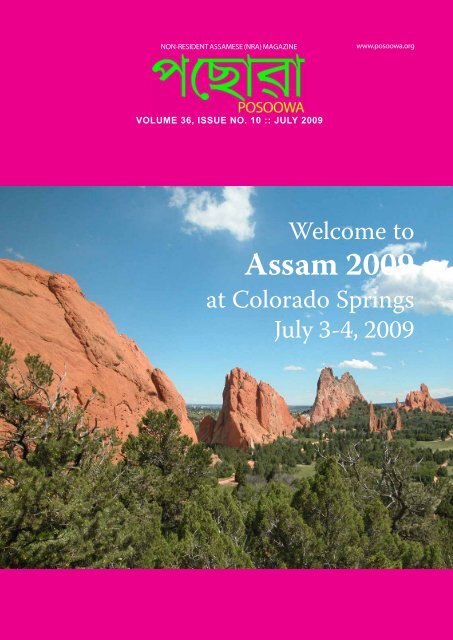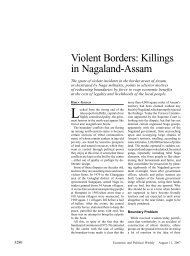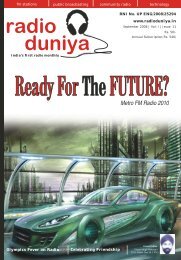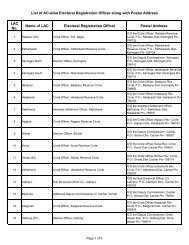Assam 2009 - AssamNet
Assam 2009 - AssamNet
Assam 2009 - AssamNet
- No tags were found...
Create successful ePaper yourself
Turn your PDF publications into a flip-book with our unique Google optimized e-Paper software.
NON-RESIDENT ASSAMESE (NRA) MAGAZINEwww.posoowa.orgVOLUME 36, ISSUE NO. 10 :: JULY <strong>2009</strong>Welcome to<strong>Assam</strong> <strong>2009</strong>at Colorado SpringsJuly 3-4, <strong>2009</strong>`1POSOOWA • June <strong>2009</strong>
Sattriya Dance performanceat LondonWhile some of India’s otherclassical dance forms haveundergone revival in therecent past prior to their modern gloryand popularity, Sattriya is not just aclassical dance form for us even thoughit originated within the sacrosanctpremises of the Sattras more than 500years ago. But it remains a livingtradition intimately woven in our lifesince its creation by MahapurushSrimanta Sankaradeva. The SangeetNatak Academy finally gave duerecognition and acceptance to this<strong>Assam</strong>ese dance form on 15 thNovember 2000 as one of the eightprincipal classical Indian dance forms.The other seven forms are Kathak,Manipuri, Kathakali, Mohiniattam,Bharatnatyam, Kuchipudi and Odissi.Today Sattriya is regularly performedto its pristine glory at the world stagethanks to the relentless efforts by someof its exponents. Far away from ourSattras, the cool summer air of Londonresonated with the sound and melodyof khol, taal and the banhi as PrateeshaSuresh and Haricharan BhuyanBarbayan of Natun Kamalabari Sattraperformed Sattriya Nritya at the NehruCentre, London on 19 th May, <strong>2009</strong>.Connoisseurs of classical dance formsin London got an opportunity to enjoythe austere yet artistic and aestheticelements of the Sattriya. Prateesha wasinvited by the Nehru Centre to presenta Sattriya recital. Shri HaricharanBhuyan and Prateesha have beenworking together relentlessly for thepromotion of Sattriya Dance for past 10years. They have presented manySattriya performances in India. FromNew Delhi, Kolkata, Mumbai, Chennai,Hyderabad, Bangalore to Jaipur,Calicut, Trivandrum, Chidambaram,Udupi, Mysore, Pondicherry, they havetaken Sattriya, far and wide.The London performances included“Ravanoloi Sitar Abhishaap” and“Usha Aniruddh”. Based on KavirajMadhava Kandali’s RAMAYANA andSHRIMAD BHAGAWATArespectively. The choreography of boththe dance pieces were created byPrateesha herself. It has been herendeavour to support the Bhakats andthis is the second time she presentedSattriya in London. Shri HaricharanBhuyan Barbayan with his experience& expertise and the team of musicianshave been a great support to Prateesha.Pratishruti Foundation- a non-profitorganization has been started by her towork for the cause of Sattriya. She hadstarted the Prratishruti Annual DanceFestival from last year where shepresented 20 artists from the Sattrasand felicitated a few senior Barbayansfor their lifelong contributions to theSattriya dance. She is starting a SattriyaDance, Music & Drama Institute atGuwahati to be inaugurated in mid-July09 and proposes to impart Sattriyatraining to enthusiasts in Mumbai fromJuly, <strong>2009</strong>.Posoowa wishes Prateesha Sureshgood luck in all her future endeavors!Best Wishes to <strong>Assam</strong> <strong>2009</strong>at Colorado Springs2POSOOWA • June <strong>2009</strong>
3Maini MahantaBedabrata Kakoti shuns peoplethese days. Reclining in an easychair, he broods over his life,waiting to join friends Parag Bhuyan,Naba Dutta and Ranjan Bora who visithim every evening. Now that he isretired, solitary calm evenings botherKakoti. He hardly noticed a morningeveningvariation during the whirlwindof his working life. Incidentally Malayahad pleaded on one occasion that theysit together in the verandah to spendthe evenings together, a proposal whichKakoti apathetically dodged. Thosewere the boisterous days when Kakotipreferred loud friends and booze as hisevening companion. The booze habitpersists, though irregularly now due tomedical advice. Malaya appears for afew minutes in the verandah with thedhunadani in her hand and soon leavessilently. Kakoti misses his wife, but thenit is really too late to begin a new habitof sitting together as a couple on thesofa. The worried old man’s heart sinksat the sight of his neighbor, a retiredcollege teacher Arindam Chaudhurystrolling blissfully down the street in thearms of his wife. Relaxed couples,oblivious of the surrounding, evenKakoti’s grand residence!Kakoti’s son Rubul, wearing jeans anda baggy shirt and carrying a bundle ofnewspapers and magazines, opens thegate to make his way in. Rubul’s clothesannoy Kakoti. Kakoti cannotcomprehend the rejection by his son.A college graduate and a bookworm,Rubul refused to join the familybusiness and started working at a bankinstead as a junior officer. Malaya andRubul are attached to each other andthis close friendship agonizes Kakoti.Malaya with her ever-smiling face justturns a bitter Kakoti more jealous andvengeful. No, Kakoti can’t leave it likethat; for his own peace of mind, he mustreveal the deep secret of his life to hisunruffled wife. The disclosure wouldshock her and soothe Kakoti. KakotiYes, I know itfrantically searches for courage tospeak up.‘Hey, anything wrong Mr Kakoti?’As usual Naba Dutta is here on timewith his friends.‘Oh, no. It is alright.’The friends proceed to the first floorroom that Kakoti uses as his sleepingquarters. Parag Bhuyan, an engineerused to be a business associate ofKakoti. They used to work ongovernment contracts together, earninggood living. Tired of his roving eyes,Bhuyan’s wife deserted him and hismarried sons and daughters do not livewith him. Bhuyan is usually the lastperson to leave the game room. NabaDutta works in the educationdepartment of the state government.He picks up the pack of cards, shufflesthem in silence and continues to faceangry young men from whom he haddemanded bribe for jobs.‘Are you feeling OK, today, Mr. Kakoti?’‘Oh no, he is ok.’ Someone responds.Ranjan Bora is alert to Kakoti’s distress.After having made some <strong>Assam</strong>esefilms during his heydays, all he can donow is to attend occasional culturalprograms as an invitee. These fourelderly gentlemen are good old friendswho worked in divergent fields. Yetdrinks, gossip and scandals continue toobsess the old heroes and hold themtogether. It is no wonder that a dejectedBedabrata Kakoti, under duress fromfamily negligence, has lately begun toshow signs of fatigue. Till recently hewas leading a busy life at a spectacularpace with little care for his wife and son.He has built his fortune making him aproud possessor of a lot of land,buildings, several cars and a hefty bankbalance. Still unforeseen loneliness didnot spare him when one fine day Kakotidecided to call it a day. Ever sinceretirement Kakoti is entirely on his ownfor the whole day awaiting arrival ofthe three friends to cheer him up in theevening. A mental change accompaniedKakoti’s retirement. He fails to join hiswife and son when they walk in thegarden or chat in the backyard. Rubulhas all along been his mother’s son,staying away from a busy and unfeelingfather. Kakoti missed a chance to knowhis son. However Malaya clasped herson endearingly only to abandonKakoti in the long run. Malaya’s pleafor her husband’s time and concernusually ended up in bitter quarrels andweeps.-‘Kakoti, are you lost?’Kakoti’s neck and head droop.-‘My God, let us take him to bed.’ NabaDutta and Bhuyan help Kakoti to liedown on bed as Ranjan Bora rushesdownstairs to inform the family.-‘Kakoti, is it headache or –-‘Water please.’Naba Dutta pours water in a glass, givesit to Kakoti who gulps it down. Malayaand Rubul enter the room hastily.Malaya touches Kakoti’s forehead tosee if it is fever.-‘It is all right now. Nothing serious.’Kakoti protests his wife’s tender touch.Her fingertips carry a typical kitchenflavor. A passionate cook, Malaya triesto satisfy Kakoti’s taste for foodpersistently. But in her role as a caringwife, Malaya perpetually finds herselfat a confusing distance. After havinglived the life strictly on his own terms,it is for Kakoti now to lament themystifying gulf.-‘Would you like a cup of tea?’ Malayainquires. Kakoti nods, but he reallyknows it is not just a cup of tea butMalaya’s company that he needs now.He is growing more and more impatientto reveal the truth. Kakoti can’t bear itany more.Malaya and Rubul walk out of the roomat the same time. Oh, Rubul could havewaited. Malaya is coming again with thecup of tea and Kakoti prepares for thefinal showdown. Rubul is a decentyoung man who does not smoke ordrink; even as a child he used to hidehis father’s bottles of liquor andPOSOOWA • June <strong>2009</strong>
cigarette cases. He even does that now.Malaya molded her son’s attitudes.-‘It is time for you to take rest, Mr.Kakoti. We will leave, see you againlater.’ Kakoti’s friends depart. Malaya isexpected in the room soon. Kakotipreviews the impending meeting whenhe would ask his wife to sit by him aftera dreadfully long time. There is noreprieve from household work, prayerroom and the kitchen to allow Kakotito ask her to sit next to him.In comes Malaya, holding the cup oftea. Kakoti scans the vermilion markon her forehead, and then, silentlyarranges his words.-‘Malaya ….’-‘Yes?’-‘Tell me about you. Are you OK?’Malaya bends forward to place the cupof tea in Kakoti’s palm.-‘Please sit here.Kakoti sips tea and makes his plea.Malaya loyally looks around to find aplace to sit. She proceeds to the sofa,feet away from Kakoti’s bed. Anearnest look at his wife makes Kakotiappreciate the enduring beauty with aspotless complexion. She would stillmatch a twenty year old damsel, onlywith a little cleansing of her face.-‘I hope you are not busy today.’-‘We have a program at the communityprayer hall, so I am expecting some ofmy neighbors.This was what Kakoti did not want tohear from his wife. He finds his wife’sschedule irksome as it shows Malayaas a most sought after woman in theneighborhood.-‘Is that so? But I wanted to tellsomething important. I need to talk toyou.’-‘Definitely we can talk, but at someother time. It is better for you to takerest now.’Kakoti finishes his cup of tea andMalaya leaves the room unworried withthe utensils in her hand. The calling bellrings- must be the neighborhoodwomen. These neighborhoodwomenfolk hardly leave Malaya alone,not even for Kakoti. Then again loyaltyof the three friends of Kakoti is alwayssuspect. Kakoti is unsure of their helpin times of trouble. Yet, Kakoti can’treturn to the family citadel. He wantsto go back to his wife and son, but the4path is blocked. Kakoti contemplatesstepping into his son’s library, but givesup the idea as it is too late to pick upthe habit of reading. Kakoti gets upfrom bed, switches off the light andreturns. The hoary old escapade withthe pretty maidservant haunts him.Malaya and Rubul were not with himat the time, on vacation at the motherin-law’s.Strikingly beautiful, sixteenyear old maidservant Kanchan waslooking after him and she lost virginity.Kakoti compensated with a hefty sumof money and told her to leave. Malayawas later told that the maidservantwent missing, no clue to herwhereabouts.Kakoti cannot help recalling the olddying man’s confessions. Heremembers the village headman,standing by the dying man’s bed,whispered to confess any misdeeds; thedying man, in response, uttered a fewwords to the village headman’s ears anddied. Kakoti was a small child when hewitnessed this incident. He can’t eraseit from his memory. Yes, it is time forhim now to replicate the dying old man’sconfessions. He ought to make theconfession to Malaya.Would she be strong enough to bearthis? She has lately developed a cardiacproblem.-‘Hey, are you asleep?’Malaya wakes up Kakoti for dinner. Sheis holding a bowl in her hand.-‘I don’t want any food. I want nothing.’-‘But it is just a bowl of soup, pleasetake it.’Malaya helps him with a spoon.-‘Ah, I can eat myself.’ Kakoti gins andclutches the bowl. Malaya is indeed ina good shape though the doctor had towarn her of a possible cardiac problem.The warning did not upset her, and sheleads a normal, confident life. She hasnever cared to dye her hair, despitefrequent pleas from Rubul to go for it.-‘You said you wanted to saysomething..’ Malaya reminds Kakotiwith her soft words, soft but strongenough to shake his heart.-‘Yes, yes. I must tell you. I must tellyou something very important. It isvery crucial. But why don’t you cometo me after you finish your dinner? Thatway it will more convenient.’Malaya obediently leaves for dinnerwith Rahul. Certainly she would return.With her departure, Kakoti’s mindreturns to the dying man’s confessionscene. Kakoti’s mind races to reviewhis achievements and rushes to have afinal look at his house, the backyard,the kitchen, the prayer room, andRubul’s library. Kakoti leaves his bedand walks carefully downstairs. Silentlyhe stands at the dining room entranceand stares meekly across at the happypair of mother and son sharing dinner.Rubul’s eyes suddenly meet his father’s.-‘Father, you there?’Rubul exclaims with surprise. Anastonished Malaya pushes her chairback and enquires why he was not inbed.-‘I need a glass of water.’-‘But there is drinking water at yourbedside. Anyway, please go up and waitfor me. I am coming soon.’Malaya hastily washes her hands.Kakoti somehow felt sorry fordisturbing them over dinner. He walksback to his room. They used to share abedroom until Kakoti moved toanother. He no longer wanted to sleepwith an ageing wife, instead porn filmcassettes in the separate bedroom wasa better substitute. Kakoti returns tohis room and reclines.-‘Do you want the lights on?’ Malayaasks him.-‘No. You sit here.’A docile Malaya sits in that part of thebed where her husband spreads his feetfor comfort. Intermittent rays of lightfrom the corridor caress Malaya’s face.Kakoti notices anxiety in her eyes.Malaya bends over to feel Kakoti’sbrow.-‘Are you still feeling unwell?’ Shetenderly asks.-‘I really want t0 tell you about anincident.’-‘Go ahead.’-‘It is about Kanchan.’- ‘But I know it. She, herself, came byhere once to tell me know everything’Malaya remains her usual self. Leastbothered she is.-‘It is time for your medicine. Take it,and here is also the glass of water.Malaya aborts the hallowed confessionwith medicine and a glass of water forher forlorn husband.~~~~~~~~~~~~~~~<strong>Assam</strong>ese original story: EdinKanchan Ahisil.Translation- Dhruva SaikiaFeedback: maini_mahanta@gmail.comPOSOOWA • June <strong>2009</strong>
5POSOOWA • June <strong>2009</strong>
6POSOOWA • June <strong>2009</strong>
7POSOOWA • June <strong>2009</strong>
8POSOOWA • June <strong>2009</strong>
9POSOOWA • June <strong>2009</strong>
10POSOOWA • June <strong>2009</strong>
11POSOOWA • June <strong>2009</strong>
12POSOOWA • June <strong>2009</strong>
13POSOOWA • June <strong>2009</strong>
ShillongChamber ChoirPerforms inBeijingMusic as it was once said byRabindranath Tagore, fillsthe infinite between twosouls. Celebrating the joy of music, aunique cultural event took place inChina’s capital city of Beijing onSaturday the 27th June. At the ConcertHall in the historic Forbidden Citycomplex, two choirs from India and SriLanka, the Shillong Chamber Choir andSoul Sounds respectively, presented ajoint concert, aptly titled, “PerfectHarmony: A Musical Journey”. TheConcert represented a meeting ofcultures, emphasizing the meaning offriendship and harmony.Speaking before the start of theconcert, and sharing the podium withher colleague, the Ambassador of SriLanka, KarunatilakaAmanugama, theAmbassador of India inChina, Nirupama Rao, toldan audience of over onethousand people, “The twochoirs you will hear today areunique in every respect.They embody grace anddignity, innocence andvision. They have the uniqueability to blend tradition withmodernity. They representthe globalizing face of ourcountries, open to new ideas,curious about the worldaround them, and at easewith both East and West.”The Concert was made possiblethrough the joint collaboration of theEmbassies of India and Sri Lanka inBeijing, with the support of the ChinesePeople’s Association for Friendship withForeign Countries.The two Choirs performed a richrepertoire drawn from classical,14traditional and folk music, and alsopopular medleys. They drewenthusiastic applause from the packedconcert hall.The two Choirs have been in touchsince 2006, when the ShillongChamber Choir visited Sri Lanka.The Concert on 27th June coincidedwith a photo exhibition of Heritage Sitesof India and Sri Lanka held at the samevenue, with the cooperation of IndiaTourism, Beijing and the Sri LankaTourist Board.By Ike Sinha, ShillongPOSOOWA • June <strong>2009</strong>
Guwahati-Dimapur railway is extendedto connect with the Bankok-Mondalayarailway by 2020, then the NE wouldbecome a direct destination. Thepresent scenario of the entire NE wouldchange, if all these infrastructures comeup.Policy makers, stakeholders and othersupporting agencies should brainstormto promote NE tourism along with theirown marketing. All natural resourceexploring organizations in the NEshould sponsor some events along withexhibitions to attract more tourists.This effort will provide advertisingbenefits to tag their branded productsand this would promote their tradingscenario as well as our heritage sites(e.g. International Conference onGaseous Fuel, Feb ’08 and also in Feb’09 in Goa organized by the OISD andsponsored by IOCL, ONGC andGAIL). For this, Sankardev-Kalakhetratype institution along with a tradecentre is also required in otherimportant tourism hub (say, a Bhupen-Bishnu-Jyoti Kalakhetra at Tezpur) toshowcase the NE heritages. Statetourism and rural developmentdepartments should have innovativepolicies to secure and promotetraditional arts, handicraft andhandloom products with regional leveltalent search drives. The ITFAA(International Trade Fare Associationof <strong>Assam</strong>) is taking initiatives byorganizing trade fairs to promote andmarket local handicraft, grains, fruitproducts, tea etc tagging as “Made inNE India” along with the GI (GeologicalIndication) certified products. NowITFAA is targeting the ASEAN markets.The FASS, an NR-NEI organization isinitiating various drives to make the NEself-reliant. Similarly, the SSA and theAUS are also helping the rural peopleto become self-reliant. For effectiveimplementation, the aid sectors likeFINER, NEDFi, CII, etc., need to frametransparent policies. Now potential ishigh to upgrade the border trade atChampai, Moreh, Nampong andNathu-La. The upcoming gas crackerproject will lead to the establishmentof more downstream industries. So,from now onwards, we need to frameoutpolicies to target the ASEANmarket. As per the initiative taken bythe Indian ambassador in Yangun, theManipur Government is planning to18organize the first ever Manipur StateTourism Fest along with Best of ASEANExpo in Nov ’09 at Moreh.For global publicity and marketing,pioneer advertising is the main tool topace up the tourism business. Thepublicity sectors of all the tourismdepartments of the NE states includingall tour agencies may redesign their webpages and should keep good linkageswith other important websites. Anycomment on a heritage site by greatpersons may also be incorporated, say- M.K. Gandhi compared the Agnigarhwith the Thames’s viewpoint in London.The model web pages of Jungle TravelsIndia Pvt. Ltd, Brahmaputra Cruise Pvt.Ltd, Purvi Discovery Pvt. Ltd. and<strong>Assam</strong> Bengal Navigation Pvt. Ltd. canmake the tourists aware of packagetours. The web page should contain ane-brochure. The colorful e-brochureof BCPL is a fantastic example. The website, www.kolkatabirds.com displayseducational information about birdsfound in the NE region. The weeklydocumentaries in TV channels likeYatra in the News Live and Rupahi-Asom in Guwahati Doordarshan aretaking role as encouraging tour guides.A video documentary on total xatriyaculture along with its ongoing practicesis a much awaited. Similarly, importantbooks on NE documentary (history,culture and heritage) would be on thatline if there is e-conversion. A one hourvideo documentary by Martin Bank hasproduced the true stories of theKaziranga NP in a global forum.Similarly, the Jaw of Death, a videodocumentary on the KNP is a goodexample. Hoardings with videoclippings about package tours need tobe displayed in each internationalairport of India. The thrilling aqua-terraadventure is organized in the Dihang(from Tuting to Pasighat) and theKameng (from Bomdila toBhalukpong) have received positivereviews from foreign experts in watersports. Nat-Geo presented a 50 minutelong documentary on it.Proper coordination among differentstakeholders will play a big role inboosting NE tourism. Our tourismdepartments along with travel andresort agents of the eight sisters and theNE Regional Tourism Departmentshould have better coordination. All theNE-DARSHAN packages should bewell designed with enjoyable itineraries.Long distance river cruise on luxuryvessels on the Brahmaputra is takinggood pace now. Steam safari will comeup soon in the Borail and Patkai hills asthe TOURFED is taking initiative.The following travel agencies arekeeping good coordination with thestate tourism departments. They aredoing their best to attract more touriststo explore NE India. It is advisable forthem to acquire a toll free number. Theyshould earnestly accept theopportunities to improve theirrankings.1. PDPL, Dibrugarh and Kolkata, e-mail: purvidiscovery@vsnl.net andpurvi@sancharnet.in.2. JTIPL, Guwahati and Kolkata, e-mail:info@jungletravelsindia.com andjti_tours@rediffmail.com.3. ABNPL, Guwahati and London, e-mail: <strong>Assam</strong>Bengal@rediffmail.com.4. BCPL, Guwahati, e-mail:bcplcruise@gmail.com.5. Rhino Travels, Guwahati, e-mail:tourinto@rhinotravels.com.6. Wave Travels, Tinsukia, e-mail:wave_ecotourism@yahoo.com.7. <strong>Assam</strong> Times Tour and Travels,Jorhat,e-mail:timestravel@yahoo.co.in.The tourists who love environment,spirituality or traditional cultures areclassified as quality tourists.Effectiveness in programs ofenvironmental awareness depends onthe growth of tourism. Progress insocio-economic and environmentaldomains depends upon attracting morequality tourists. More inflow ofbackpackers may destroy the socialvalues as well as the environment.–A. Medhi, NumaligarhPOSOOWA • June <strong>2009</strong>
Visit www.<strong>Assam</strong>.org and its sister sites:www.Guwahati.com, www.Shillong.comwww.Bihu.in, www.ClassAmigo.com, www.Melahi.comPosoowa is published monthly. Ganesh Bora, on behalf of <strong>Assam</strong> Society of America, has published this issue ofPosoowa. The editors are Ankur Bora (Texas), Babul Gogoi (New Delhi, India), Barnali Das (New Delhi), GaneshBora (Fargo, North Dakota), Jugal Kalita (Colorado Springs, Colorado, Editor-in-Chief ), Kaushik Phukan (Seattle,Washington), Manoj Kumar Das (New Delhi), Rini Kakati (London, UK), Sanchayita Sharma (London, UK), SatyamBhuyan (Ames, Iowa) and Umesh Sharma (College Park, Washington D.C).ASA Executive Committee: President: Dr. Ganesh Bora, Fargo, ND; Past President:Mr. Dhruba Das, Coatesville, PA;Vice President: Dr. Samar Jyoti Bhuyan, Phoenix, AZ; General Secretary: Mr. Utpal Borah, Glenmoore, PA. ExecutiveMembers: Mr. Kedar Bhuyan, Mays Landing, NJ, Dr. Nilakshi Phukan, Raleigh, NC, Ms. Bornali Talukdar, Omaha,NE, Mr. Arindam Barkataky, Orlando, FL, Mr. Probal Tahbildar, Kendall Park, NJ.We invite contributors from all over the world. We appreciate your valuable feedback, comments & suggestions, andof course, news from your part of the world for inclusion in the coming editions. Please send your written contributionsto posoowa@assam.org. If you prefer, you can send your contributions directly to any of the editors listed above aswell. Any contribution must be 750 words or shorter in length. Please include a scanned image of the author. We alsorequest you to submit other pertinent photographs if possible.<strong>Assam</strong> Society of AmericaPO Box 254Mays LandingNJ 08330USA19POSOOWA • June <strong>2009</strong>





